“主语+连系动词”的省略方式
省略句主语与助动词的省略
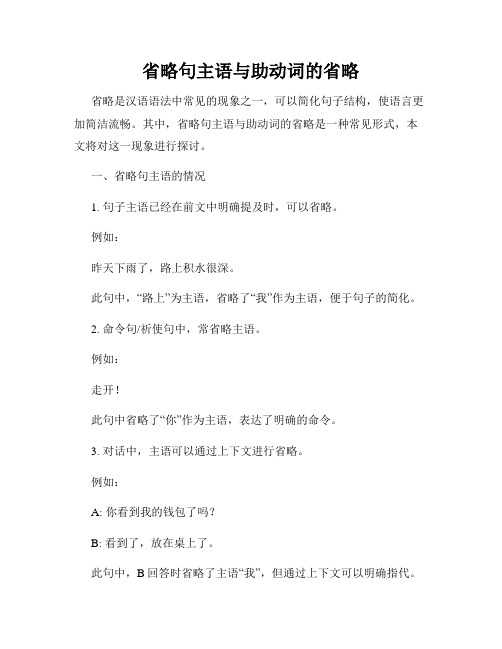
省略句主语与助动词的省略省略是汉语语法中常见的现象之一,可以简化句子结构,使语言更加简洁流畅。
其中,省略句主语与助动词的省略是一种常见形式,本文将对这一现象进行探讨。
一、省略句主语的情况1. 句子主语已经在前文中明确提及时,可以省略。
例如:昨天下雨了,路上积水很深。
此句中,“路上”为主语,省略了“我”作为主语,便于句子的简化。
2. 命令句/祈使句中,常省略主语。
例如:走开!此句中省略了“你”作为主语,表达了明确的命令。
3. 对话中,主语可以通过上下文进行省略。
例如:A: 你看到我的钱包了吗?B: 看到了,放在桌上了。
此句中,B回答时省略了主语“我”,但通过上下文可以明确指代。
二、省略助动词的情况1. 句子中谓语动词为系动词(是、在、有等)时,助动词可以省略。
例如:他是个老师。
此句中省略了助动词“是”,表示简单的身份说明。
2. 句子中谓语动词已经明确,且结构相当简单时,助动词可以省略。
例如:他喜欢看电影,我也喜欢(看)。
此句中省略了助动词“看”,因为上下文已经明确。
三、省略句主语与助动词的正确运用省略句主语与助动词的使用需要注意上下文的连贯性和表达的准确性。
在使用中应遵循以下原则:1. 句子通顺明了。
省略不应造成句子结构混乱或含义模糊。
2. 上下文一致。
通过上文或下文的暗示,使得省略的部分可以明确指代。
3. 根据语言习惯。
正确的省略应符合通用的语法规则和习惯用法。
总结:省略句主语与助动词是汉语中常见的句法现象,通过省略可以简化句子,使语言更富有节奏感和流畅性。
然而,我们在使用时需要注意上下文的连贯性和表达的准确性,才能达到有效沟通的目的。
会考复习——倒装句、强调句、省略句
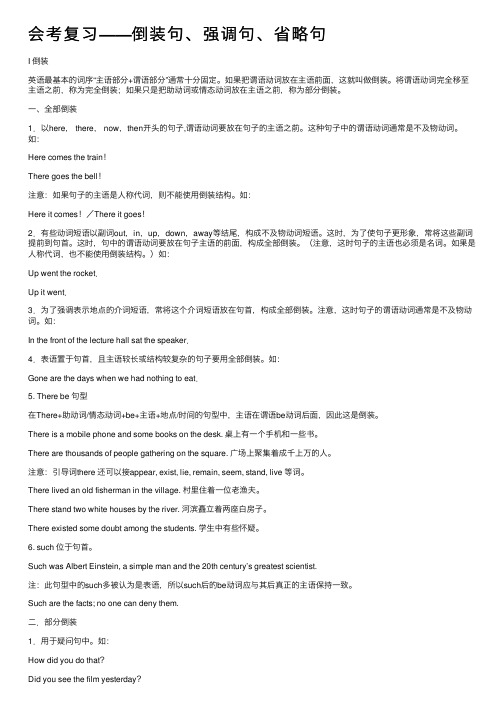
会考复习——倒装句、强调句、省略句I 倒装英语最基本的词序“主语部分+谓语部分”通常⼗分固定。
如果把谓语动词放在主语前⾯,这就叫做倒装。
将谓语动词完全移⾄主语之前,称为完全倒装;如果只是把助动词或情态动词放在主语之前,称为部分倒装。
⼀、全部倒装1.以here, there, now,then开头的句⼦,谓语动词要放在句⼦的主语之前。
这种句⼦中的谓语动词通常是不及物动词。
如:Here comes the train!There goes the bell!注意:如果句⼦的主语是⼈称代词,则不能使⽤倒装结构。
如:Here it comes!/There it goes!2.有些动词短语以副词out,in,up,down,away等结尾,构成不及物动词短语。
这时,为了使句⼦更形象,常将这些副词提前到句⾸。
这时,句中的谓语动词要放在句⼦主语的前⾯,构成全部倒装。
(注意,这时句⼦的主语也必须是名词。
如果是⼈称代词,也不能使⽤倒装结构。
)如:Up went the rocket.Up it went.3.为了强调表⽰地点的介词短语,常将这个介词短语放在句⾸,构成全部倒装。
注意,这时句⼦的谓语动词通常是不及物动词。
如:In the front of the lecture hall sat the speaker.4.表语置于句⾸,且主语较长或结构较复杂的句⼦要⽤全部倒装。
如:Gone are the days when we had nothing to eat.5. There be 句型在There+助动词/情态动词+be+主语+地点/时间的句型中,主语在谓语be动词后⾯,因此这是倒装。
There is a mobile phone and some books on the desk. 桌上有⼀个⼿机和⼀些书。
There are thousands of people gathering on the square. ⼴场上聚集着成千上万的⼈。
特殊句式 强调、省略和倒装
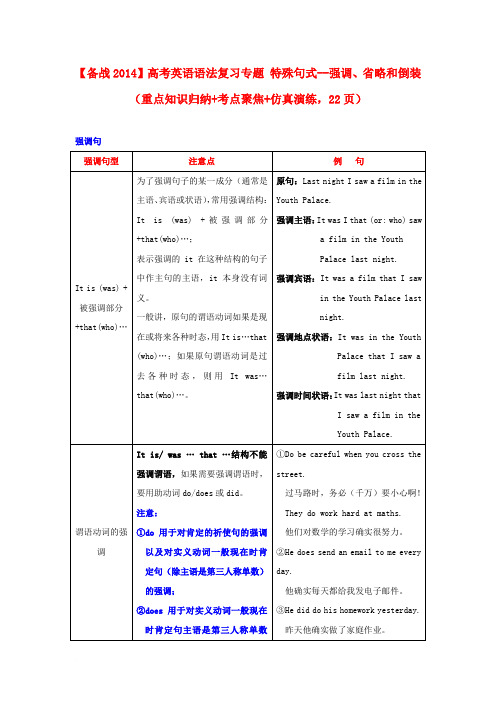
【备战2014】高考英语语法复习专题特殊句式--强调、省略和倒装(重点知识归纳+考点聚焦+仿真演练,22页)强调句强调句型注意点例句It is (was) + 被强调部分+that(who)…为了强调句子的某一成分(通常是主语、宾语或状语),常用强调结构:It is (was) +被强调部分+that(who)…;表示强调的it在这种结构的句子中作主句的主语,it本身没有词义。
一般讲,原句的谓语动词如果是现在或将来各种时态,用It is…that(who)…;如果原句谓语动词是过去各种时态,则用It was…that(who)…。
原句:Last night I saw a film in theYouth Palace.强调主语:It was I that (or: who) sawa film in the YouthPalace last night.强调宾语:It was a film that I sawin the Youth Palace lastnight.强调地点状语:It was in the YouthPalace that I saw afilm last night.强调时间状语:It was last night thatI saw a film in theYouth Palace.谓语动词的强调It is/ was … that …结构不能强调谓语,如果需要强调谓语时,要用助动词do/does或did。
注意:①do用于对肯定的祈使句的强调以及对实义动词一般现在时肯定句(除主语是第三人称单数)的强调;②does用于对实义动词一般现在时肯定句主语是第三人称单数①Do be careful when you cross thestreet.过马路时,务必(千万)要小心啊!They do work hard at maths.他们对数学的学习确实很努力。
②He does send an email to me everyday.他确实每天都给我发电子邮件。
英语省略句的用法和种类
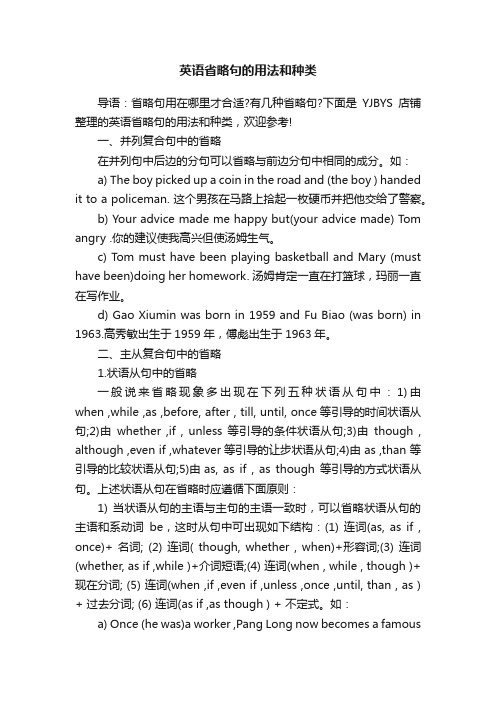
英语省略句的用法和种类导语:省略句用在哪里才合适?有几种省略句?下面是YJBYS店铺整理的英语省略句的用法和种类,欢迎参考!一、并列复合句中的省略在并列句中后边的分句可以省略与前边分句中相同的成分。
如:a) The boy picked up a coin in the road and (the boy ) handed it to a policeman. 这个男孩在马路上拾起一枚硬币并把他交给了警察。
b) Your advice made me happy but(your advice made) Tom angry .你的建议使我高兴但使汤姆生气。
c) Tom must have been playing basketball and Mary (must have been)doing her homework. 汤姆肯定一直在打篮球,玛丽一直在写作业。
d) Gao Xiumin was born in 1959 and Fu Biao (was born) in 1963.高秀敏出生于1959年,傅彪出生于1963年。
二、主从复合句中的省略1.状语从句中的省略一般说来省略现象多出现在下列五种状语从句中:1)由when ,while ,as ,before, after , till, until, once等引导的时间状语从句;2)由whether ,if , unless 等引导的条件状语从句;3)由though , although ,even if ,whatever等引导的让步状语从句;4)由 as ,than 等引导的比较状语从句;5)由as, as if , as though 等引导的方式状语从句。
上述状语从句在省略时应遵循下面原则:1) 当状语从句的主语与主句的主语一致时,可以省略状语从句的主语和系动词be,这时从句中可出现如下结构:(1) 连词(as, as if , once)+ 名词; (2) 连词( though, whether , when)+形容词;(3) 连词(whether, as if ,while )+介词短语;(4) 连词(when , while , though )+ 现在分词; (5) 连词(when ,if ,even if ,unless ,once ,until, than , as ) + 过去分词; (6) 连词(as if ,as though ) + 不定式。
比较状语从句省略
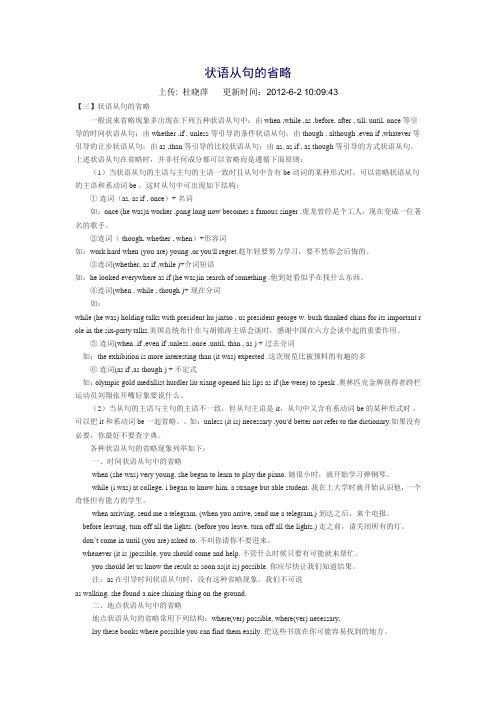
状语从句的省略上传: 杜晓萍更新时间:2012-6-2 10:09:43【三】状语从句的省略一般说来省略现象多出现在下列五种状语从句中:由 when ,while ,as ,before, after , till, until, once等引导的时间状语从句;由whether ,if , unless 等引导的条件状语从句;由 though , although ,even if ,whatever等引导的让步状语从句;由 as ,than 等引导的比较状语从句;由as, as if , as though 等引导的方式状语从句。
上述状语从句在省略时,并非任何成分都可以省略而是遵循下面原则:(1)当状语从句的主语与主句的主语一致时且从句中含有be动词的某种形式时,可以省略状语从句的主语和系动词be ,这时从句中可出现如下结构:①连词(as, as if , once)+ 名词如:once (he was)a worker ,pang long now becomes a famous singer .庞龙曾经是个工人,现在变成一位著名的歌手。
②连词( though, whether , when)+形容词如:work hard when (you are) young ,or you'll regret.趁年轻要努力学习,要不然你会后悔的。
③连词(whether, as if ,while )+介词短语如:he looked everywhere as if (he was)in search of something .他到处看似乎在找什么东西。
④连词(when , while , though )+ 现在分词如:while (he was) holding talks with president hu jintao , us president george w. bush thanked china for its important r ole in the six-party talks.美国总统布什在与胡锦涛主席会谈时,感谢中国在六方会谈中起的重要作用。
asif的三种用法
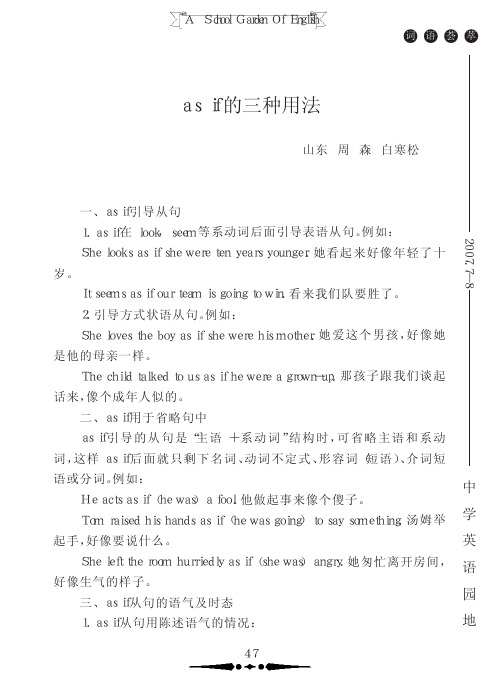
语或分词。例如:
中
He acts as if ( he was) a fool. 他做起事来像个傻子。
Tom raised his hands as if ( he was going) to say something. 汤姆举 学
起手, 好像要说什么。
英
She left the room hurriedly as if ( she was) angry. 她匆忙离开房间, 语
是他的母亲一样。
The child talked to us as if he were a grown-up. 那孩子跟我们谈起
话来, 像个成年人似的。
二、as if 用于省略句中
as if 引 导 的 从 句 是 “主 语 + 系 动 词 ”结 构 时 , 可 省 略 主 语 和 系 动
词, 这样 as if 后面就只剩下名词、动词不定式、形容词( 短语) 、介词短
A School Garden Of English
48
好像生气的样子。
园 三、as if 从句的语气及时态
1. as if 从句用陈述语气的情况:
地
47
2007.7- 8
词语荟萃
中学英语园地
当说话者认为句子所述的是真实的或极有可能发生或存在的事实 时。例如:
It sounds as if it is raining. 听起来天像是在下雨。 He talks as if he is drunk. 从他谈话的样子来看他是醉了。 2. as if 从句用虚拟语气的情况: 当说话人认为句子所述的是不真实的或极少可能发生或存在的情 况时, 从句中的谓语动词用虚拟语气的各种形式。 ( 1) 如果从句表示与现在的事实相反时, 谓语动词用一般过去 时 。例 如 : You look as if you didn’t care. 你看上去好像并不在乎。 He talks as if he knew where she was. 他说话的样子, 好像他知道 她在哪里似的。 She speaks to me as if she knew me. 她 跟 我 讲 话 , 好 像 认 识 我 似 的。 ( 2) 从句表示与过去的事实相反时, 谓语动词用“had + 过去分词”。 例如: He talks about Rome as if he had been there before. 他说起罗马来 好像他以前去过罗马似的。 The girl listened as if she had been turned to stone. 那女孩倾听着, 一动也不动, 好像已经变成了石头似的。 She looked as if she were made of ice. 她看起来像是冰做的。 ( 3) 从句表示与将来的事实相反或将来发生的可能性极小时, 谓 语动词用“would /could /might + 动词原形”。例如: He opened his mouth as if he would say something. 他 张 开 嘴 好 像 要说什么。 It looks as if it might snow. 看起来天好像要下雪了。 It seemed as if the meeting would never end. 这个会看起来永远也 不会结束。
不定式的省略
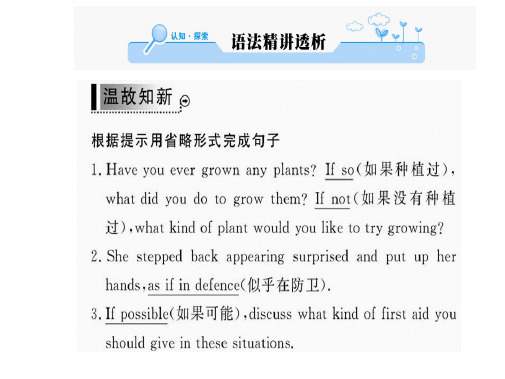
D
---He hasn’t finished yet.
---Well,he ought to have.
1. -----Are you a sailor?
----- No, but I ____C___
A. am not B. used to C. used to be ed to being 2. -
2. 省to留do的用法。
I hope to finish my job and (to) go back home. 我希 望做完事回家。
What we could do was (to) get away. (主语从句 中含有do,那么作表语的动词不定式往往省略to)
There is nothing to do but (to) obey the orders. 除了服从命令之外,我们别无他法。(介词but 前如有do,but后可省略to)
To be or not to be, that is the question. 活着还 是死亡,这就是问题所在。(莎士比亚) It was better to laugh than to cry. 笑比哭好。
It was better to laugh than to cry. 笑比哭好。
当两个并列的不定式在意义上表示 对比关系时,后面的不定式一般不 省略to。
• 答:B。
---- Aren’t you the manager? ---- No, and I__B ____ • A. don’t want to B. don’t want to be • C. don’t want be D. don’t want
• —Are you a student?
time.
状语从句主谓成分的省略
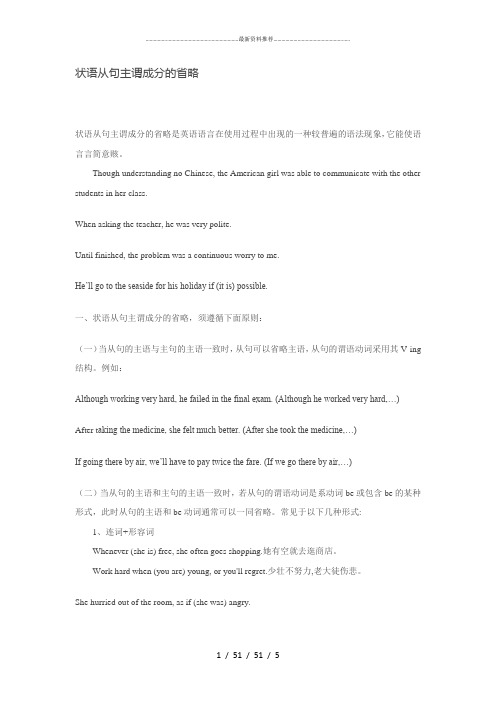
状语从句主谓成分的省略状语从句主谓成分的省略是英语语言在使用过程中出现的一种较普遍的语法现象,它能使语言言简意赅。
Though understanding no Chinese, the American girl was able to communicate with the other students in her class.When asking the teacher, he was very polite.Until finished, the problem was a continuous worry to me.He’ll go to the seaside for his holiday if (it is) possible.一、状语从句主谓成分的省略,须遵循下面原则:(一)当从句的主语与主句的主语一致时,从句可以省略主语,从句的谓语动词采用其V-ing 结构。
例如:Although working very hard, he failed in the final exam. (Although he worked very hard,…)After t aking the medicine, she felt much better. (After she took the medicine,…)If going there by air, we’ll have to pay twice the fare. (If we go there by air,…)(二)当从句的主语和主句的主语一致时,若从句的谓语动词是系动词be或包含be的某种形式,此时从句的主语和be动词通常可以一同省略。
常见于以下几种形式:1、连词+形容词Whenever (she is) free, she often goes shopping.她有空就去逛商店。
Work hard when (you are) young, or you'll regret.少壮不努力,老大徒伤悲。
高中英语新高考-语法:专题(基础篇)——连系动词,否定陈述,省略,倒装,强调句
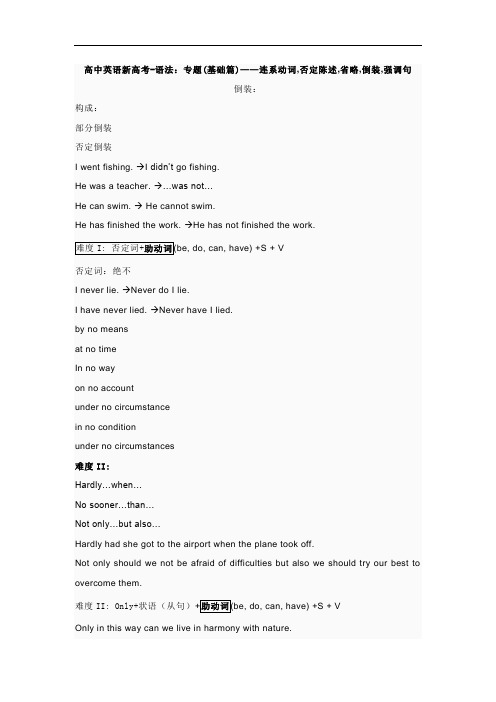
Only because was he busy he did not come to attend your birthday party. (×)Only because he was busy did he not come to attend your birthday party. (√)Only he can finish the job.难度III:So + adj. +be +S+…So+ adv. +助动词(do, can, have) +S + VSo thought-provoking is the picture that it should awaken us to the problem.So clearly does he speak English that he can always make himself understood. (×) 难度III: However +adj./adv. +S + V,However is he late, Mother will wait for him to have dinner together. (×)However late he is, Mother will wait for him to have dinner together. (√)难度IV:Adj./Adv./N. +though/as+S V, SVOHeavily though/as it rained, many of us overcame the difficulty and came attending the lecture.Child as he is, he knows a lot about computer. (×)Not until…I di dn’t go to bed until he came home.Not until he came home did I go to bed.全倒装SVO OVS难度I: 1)方向类的副词Hurry up, Tom. Here comes the bus.In he came hurriedly, telling us that the enemies were coming toward the village. (×)难度II介词短语+V(be, lie, stand, exist)+S, 修饰In the picture stands a girl, who ran to her mother happily when…In the north of the city stands a beautiful school, which enjoys the distinction of smartest students and teachers.—My husband never washes the dishes.—So is mine. (×)—Neither / Nor does mine. (√)强调难度I: It is/was +被强调的部分+that…n./pron.II: 介词短语/状语从句It was not until he came that I finished my work.It was on Monday that I picked up a purse.III. 特殊疑问:Wh- is/was it that…I wonder wh- it is/was that…IV. 省略---Hi, Tom, do you have any idea when Sundance Festival came into being?---Oh, yes, I do. It was in 1978 when China just began its economic reform (that Sundance…)连系动词打怪级别:I (★★)●连系动词是用来连接句子主语和表示该主语所处状态的成分的动词。
状语从句省略的十大类型
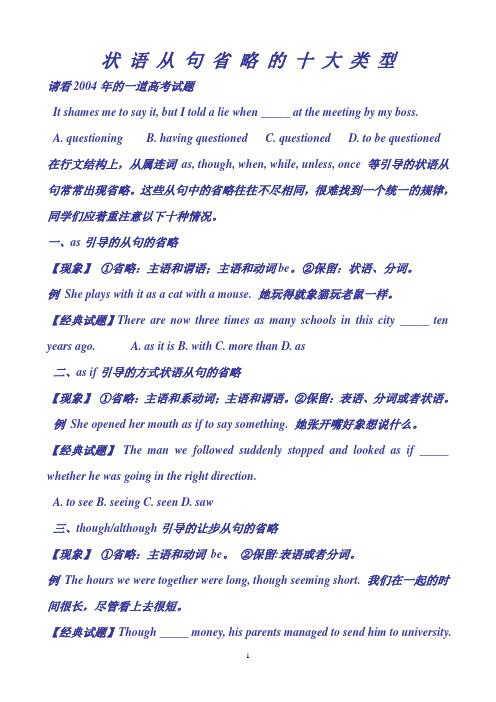
状语从句省略的十大类型请看2004年的一道高考试题It shames me to say it, but I told a lie when _____ at the meeting by my boss.A. questioningB. having questionedC. questionedD. to be questioned 在行文结构上,从属连词as, though, when, while, unless, once 等引导的状语从句常常出现省略。
这些从句中的省略往往不尽相同,很难找到一个统一的规律,同学们应着重注意以下十种情况。
一、as引导的从句的省略【现象】①省略:主语和谓语;主语和动词be。
②保留:状语、分词。
例She plays with it as a cat with a mouse. 她玩得就象猫玩老鼠一样。
【经典试题】There are now three times as many schools in this city _____ ten years ago. A. as it is B. with C. more than D. as二、as if引导的方式状语从句的省略【现象】①省略:主语和系动词;主语和谓语。
②保留:表语、分词或者状语。
例She opened her mouth as if to say something. 她张开嘴好象想说什么。
【经典试题】The man we followed suddenly stopped and looked as if _____ whether he was going in the right direction.A. to seeB. seeingC. seenD. saw三、though/although引导的让步从句的省略【现象】①省略:主语和动词be。
②保留:表语或者分词。
例The hours we were together were long, though seeming short. 我们在一起的时间很长,尽管看上去很短。
高中英语Unit3ⅢGrammar--省略教学案
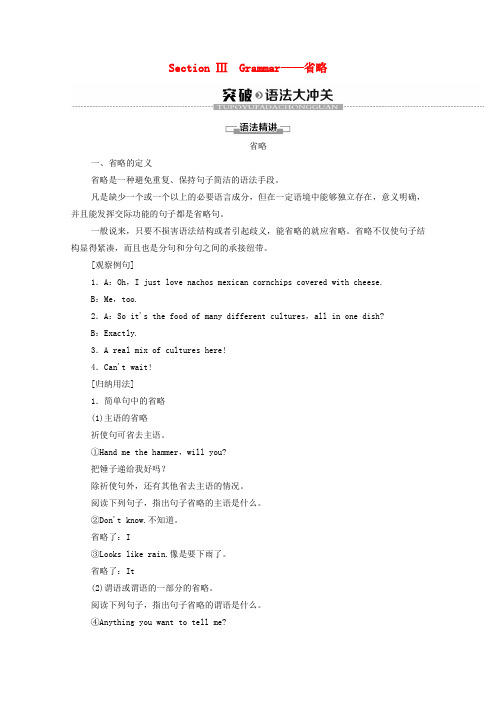
Section ⅢGrammar——省略省略一、省略的定义省略是一种避免重复、保持句子简洁的语法手段。
凡是缺少一个或一个以上的必要语言成分,但在一定语境中能够独立存在,意义明确,并且能发挥交际功能的句子都是省略句。
一般说来,只要不损害语法结构或者引起歧义,能省略的就应省略。
省略不仅使句子结构显得紧凑,而且也是分句和分句之间的承接纽带。
[观察例句]1.A:Oh,I just love nachos mexican cornchips covered with cheese.B:Me,too.2.A:So it's the food of many different cultures,all in one dish?B:Exactly.3.A real mix of cultures here!4.Can't wait![归纳用法]1.简单句中的省略(1)主语的省略祈使句可省去主语。
①Hand me the hammer,will you?把锤子递给我好吗?除祈使句外,还有其他省去主语的情况。
阅读下列句子,指出句子省略的主语是什么。
②Don't know.不知道。
省略了:I③Looks like rain.像是要下雨了。
省略了:It(2)谓语或谓语的一部分的省略。
阅读下列句子,指出句子省略的谓语是什么。
④Anything you want to tell me?有什么事要告诉我吗?省略了:Is there⑤The students still waiting?学生们还在等吗?省略了:Are(3)主语和谓语,或主语和谓语的一部分的省略。
阅读下列句子,指出句子省略了什么。
⑥(2016·浙江卷)—The movie starts at 8:30,and we can have a quick bite before we go.——电影8:30开始,我们可以快速地吃点东西就走。
高中英语语法特殊句式(倒装、省略、强调)
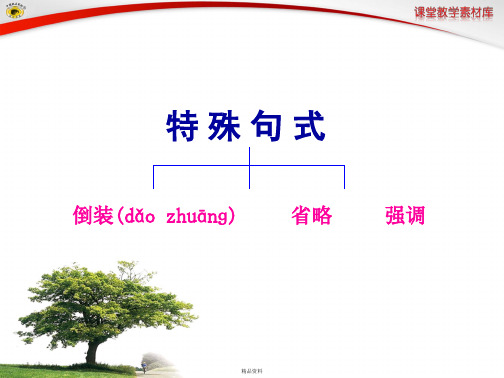
3.在对话或并列句中,如果主语(zhǔyǔ)、谓语不同,而宾语相同, 则常省去相同的宾语部分。 Tom enjoys dancing, but Peter hates (dancing).
精品资料
4.省略作宾语的不定式短语,只保留to,但如果该宾语是动词 be或完成时态,则须在之后加上be或have: —Are you going there? —Yes, I’d like to (go there). 注意(zhù yì):在下列词后常省略不定式但要保留to: want, wish, like, hate, hope, intend, plan, love, refuse, expect,但当 want 和like用于从句中时,to常常省略。
My office was on the tenth floor, and his (office was) on the twelfth (floor). 并列句的省略有时还可出现在前面(qián mian)的分句 中,这时被省略的词语便出现在下文。
精品资料
5.only + 状语(zhuàngyǔ)(副词、介词短语、状语(zhuàngyǔ)从句)放在句首时 。(部分倒装) 1)Only then did I realize the value of reading aloud every morning. 2)Only by means of talking can we avoid misunderstanding each other.
精品资料
2.方位词in, out, there, here, inside, outside, up, down, away, off, downstairs, upstairs等以及now, then置于句首时,谓语动词常用 be, come, go, lie, run等,并且句子的主语(zhǔyǔ)是名词。为以示 强调或为了使情景更生动, 要全部倒装。(全部倒装) 1) Away flew the bird which I bought yesterday. 2) Now comes your turn to sweep the floor. 注意: 主语(zhǔyǔ)是人称代词时,仍用自然语序。 Away they went. (=They went away.)
省略句
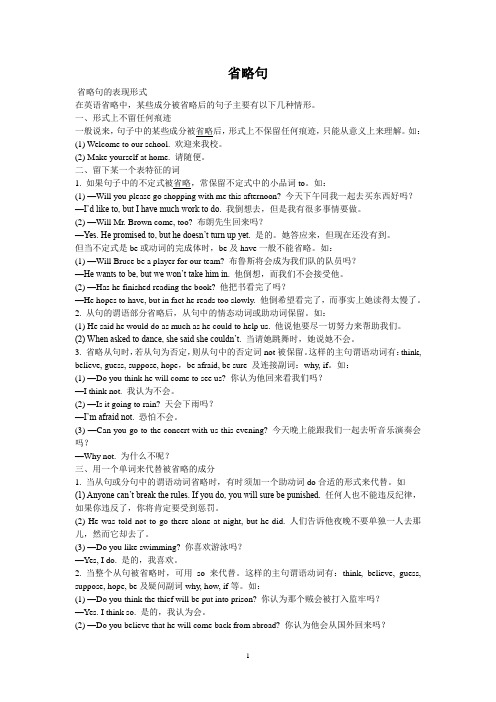
省略句省略句的表现形式在英语省略中,某些成分被省略后的句子主要有以下几种情形。
一、形式上不留任何痕迹一般说来,句子中的某些成分被省略后,形式上不保留任何痕迹,只能从意义上来理解。
如:(1) Welcome to our school. 欢迎来我校。
(2) Make yourself at home. 请随便。
二、留下某一个表特征的词1. 如果句子中的不定式被省略,常保留不定式中的小品词to。
如:(1) —Will you please go shopping with me this afternoon? 今天下午同我一起去买东西好吗?—I’d like to, but I have much work to do. 我倒想去,但是我有很多事情要做。
(2) —Will Mr. Brown come, too? 布朗先生回来吗?—Yes. He promised to, but he doesn’t turn up yet. 是的。
她答应来,但现在还没有到。
但当不定式是be或动词的完成体时,be及have一般不能省略。
如:(1) —Will Bruce be a player for our team? 布鲁斯将会成为我们队的队员吗?—He wants to be, but we won’t take him in. 他倒想,而我们不会接受他。
(2) —Has he finished reading the book? 他把书看完了吗?—He hopes to have, but in fact he reads too slowly. 他倒希望看完了,而事实上她读得太慢了。
2. 从句的谓语部分省略后,从句中的情态动词或助动词保留。
如:(1) He said he would do as much as he could to help us. 他说他要尽一切努力来帮助我们。
(2) When asked to dance, she said she couldn’t. 当请她跳舞时,她说她不会。
英语语法-无动词分句
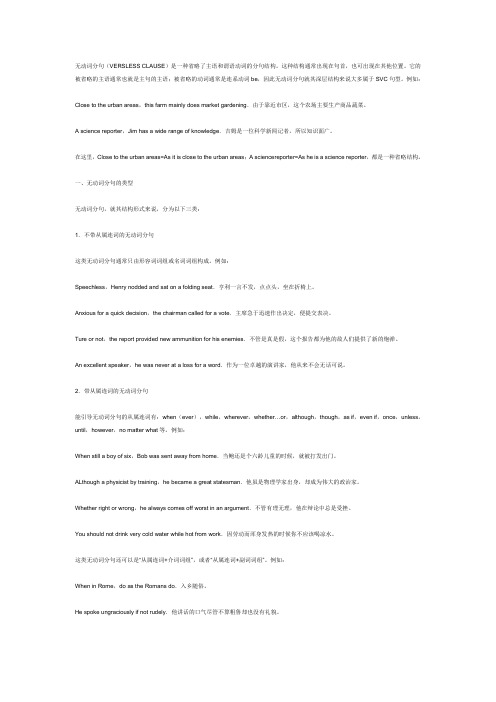
无动词分句(VERSLESS CLAUSE)是一种省略了主语和谓语动词的分句结构。
这种结构通常出现在句首,也可出现在其他位置。
它的被省略的主语通常也就是主句的主语;被省略的动词通常是连系动词be,因此无动词分句就其深层结构来说大多属于SVC句型。
例如:Close to the urban areas,this farm mainly does market gardening.由于靠近市区,这个农场主要生产商品蔬菜。
A science reporter,Jim has a wide range of knowledge.吉姆是一位科学新闻记者,所以知识面广。
在这里,Close to the urban areas=As it is close to the urban areas;A sciencereporter=As he is a science reporter,都是一种省略结构。
一、无动词分句的类型无动词分句,就其结构形式来说,分为以下三类:1.不带从属连词的无动词分句这类无动词分句通常只由形容词词组或名词词组构成。
例如:Speechless,Henry nodded and sat on a folding seat.亨利一言不发,点点头,坐在折椅上。
Anxious for a quick decision,the chairman called for a vote.主席急于迅速作出决定,便提交表决。
Ture or not,the report provided new ammunition for his enemies.不管是真是假,这个报告都为他的敌人们提供了新的炮弹。
An excellent speaker,he was never at a loss for a word.作为一位卓越的演讲家,他从来不会无话可说。
2.带从属连词的无动词分句能引导无动词分句的从属连词有:when(ever),while,wherever,whether…or,although,though,as if,even if,once,unless,until,however,no matter what等。
省略句在英语中的类型和用法
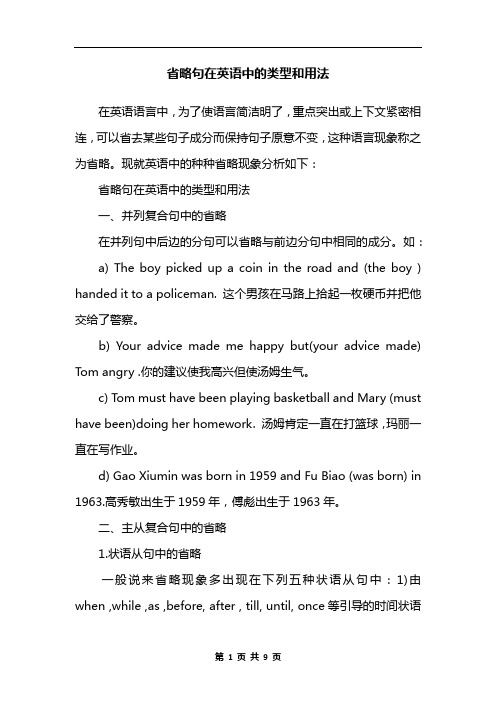
省略句在英语中的类型和用法在英语语言中,为了使语言简洁明了,重点突出或上下文紧密相连,可以省去某些句子成分而保持句子原意不变,这种语言现象称之为省略。
现就英语中的种种省略现象分析如下:省略句在英语中的类型和用法一、并列复合句中的省略在并列句中后边的分句可以省略与前边分句中相同的成分。
如:a) The boy picked up a coin in the road and (the boy ) handed it to a policeman. 这个男孩在马路上拾起一枚硬币并把他交给了警察。
b) Your advice made me happy but(your advice made) Tom angry .你的建议使我高兴但使汤姆生气。
c) Tom must have been playing basketball and Mary (must have been)doing her homework. 汤姆肯定一直在打篮球,玛丽一直在写作业。
d) Gao Xiumin was born in 1959 and Fu Biao (was born) in 1963.高秀敏出生于1959年,傅彪出生于1963年。
二、主从复合句中的省略1.状语从句中的省略一般说来省略现象多出现在下列五种状语从句中:1)由when ,while ,as ,before, after , till, until, once等引导的时间状语从句;2)由whether ,if , unless 等引导的条件状语从句;3)由though , although ,even if ,whatever等引导的让步状语从句;4)由as ,than 等引导的比较状语从句;5)由as, as if , as though 等引导的方式状语从句。
上述状语从句在省略时应遵循下面原则:1) 当状语从句的主语与主句的主语一致时,可以省略状语从句的主语和系动词be,这时从句中可出现如下结构:(1) 连词(as, as if , once)+ 名词; (2) 连词( though, whether , when)+形容词;(3) 连词(whether, as if ,while )+介词短语;(4) 连词(when , while , though )+ 现在分词; (5) 连词(when ,if ,even if ,unless ,once ,until, than , as ) + 过去分词; (6) 连词(as if ,as though ) + 不定式。
状语从句,定语从句、宾语从句的省略

Unit 5
First aid
:什么时候可以省略?怎么省略? 在含有状语从句的复合句中若从句的主句是it或与 主句的主语相同,且在谓语中含有be时,常省略从 句的主语和be。 1._____________________ When/While in Beijing (在北京的时候), I paid a visit to the Summer Palace. When/As a young man 当是个年轻人的时候), 2. ______________________( Abraham Lincoln was a storekeeper and a postmaster. 3. He has no money. ______ If any (要是有的话), he will give us. Unless repaired 除非修理), the machine is of no use. 4._____________( 5. _______________________( If given more attention to 要是给更多的关注), The boy could have turned out better. 6. A girl stood at the gate of the school as if _________ _____________________( talking with a teacher 跟老师讲话).
栏目 导引
Unit 5
First aid
Ⅰ 单句语法填空 ordered 1.Although ___________ (order) to stop, the driver kept on
driving as fast as he could.
英语复合句的省略用法
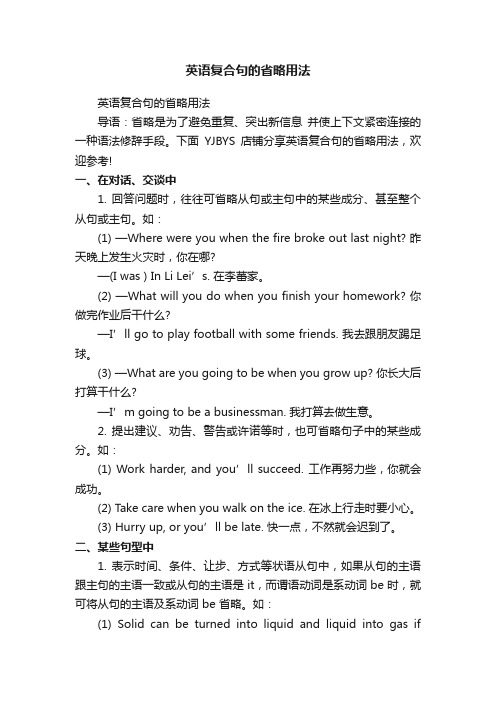
英语复合句的省略用法英语复合句的省略用法导语:省略是为了避免重复、突出新信息并使上下文紧密连接的一种语法修辞手段。
下面YJBYS店铺分享英语复合句的省略用法,欢迎参考!一、在对话、交谈中1. 回答问题时,往往可省略从句或主句中的某些成分、甚至整个从句或主句。
如:(1) —Where were you when the fire broke out last night? 昨天晚上发生火灾时,你在哪?—(I was ) In Li Lei’s. 在李蕾家。
(2) —What will you do when you finish your homework? 你做完作业后干什么?—I’ll go to play football with some friends. 我去跟朋友踢足球。
(3) —What are you going to be when you grow up? 你长大后打算干什么?—I’m going to be a businessman. 我打算去做生意。
2. 提出建议、劝告、警告或许诺等时,也可省略句子中的某些成分。
如:(1) Work harder, and you’ll succeed. 工作再努力些,你就会成功。
(2) Take care when you walk on the ice. 在冰上行走时要小心。
(3) Hurry up, or you’ll be late. 快一点,不然就会迟到了。
二、某些句型中1. 表示时间、条件、让步、方式等状语从句中,如果从句的主语跟主句的主语一致或从句的主语是it,而谓语动词是系动词be时,就可将从句的主语及系动词 be 省略。
如:(1) Solid can be turned into liquid and liquid into gas ifheated enough. =solid can be turned into liquid and liquid can be turned into gas if it is heated enough. 如果加到足够的热,固体会变成液体,而液体又会变成气体。
英语语法-无动词分句
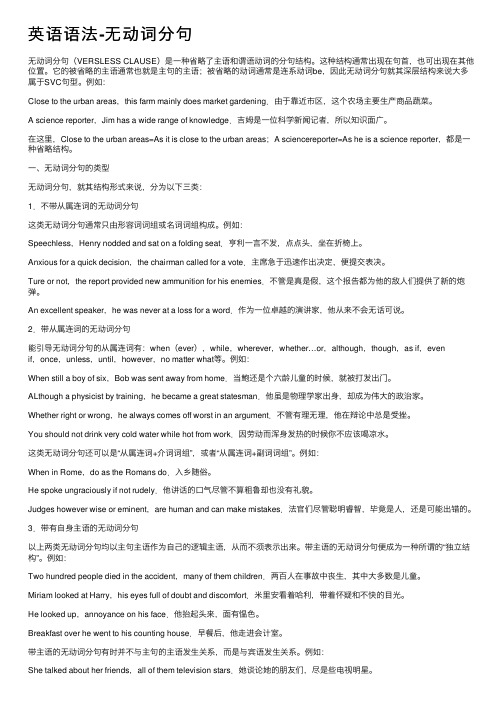
英语语法-⽆动词分句⽆动词分句(VERSLESS CLAUSE)是⼀种省略了主语和谓语动词的分句结构。
这种结构通常出现在句⾸,也可出现在其他位置。
它的被省略的主语通常也就是主句的主语;被省略的动词通常是连系动词be,因此⽆动词分句就其深层结构来说⼤多属于SVC句型。
例如:Close to the urban areas,this farm mainly does market gardening.由于靠近市区,这个农场主要⽣产商品蔬菜。
A science reporter,Jim has a wide range of knowledge.吉姆是⼀位科学新闻记者,所以知识⾯⼴。
在这⾥,Close to the urban areas=As it is close to the urban areas;A sciencereporter=As he is a science reporter,都是⼀种省略结构。
⼀、⽆动词分句的类型⽆动词分句,就其结构形式来说,分为以下三类:1.不带从属连词的⽆动词分句这类⽆动词分句通常只由形容词词组或名词词组构成。
例如:Speechless,Henry nodded and sat on a folding seat.亨利⼀⾔不发,点点头,坐在折椅上。
Anxious for a quick decision,the chairman called for a vote.主席急于迅速作出决定,便提交表决。
Ture or not,the report provided new ammunition for his enemies.不管是真是假,这个报告都为他的敌⼈们提供了新的炮弹。
An excellent speaker,he was never at a loss for a word.作为⼀位卓越的演讲家,他从来不会⽆话可说。
2.带从属连词的⽆动词分句能引导⽆动词分句的从属连词有:when(ever),while,wherever,whether…or,although,though,as if,evenif,once,unless,until,however,no matter what等。
- 1、下载文档前请自行甄别文档内容的完整性,平台不提供额外的编辑、内容补充、找答案等附加服务。
- 2、"仅部分预览"的文档,不可在线预览部分如存在完整性等问题,可反馈申请退款(可完整预览的文档不适用该条件!)。
- 3、如文档侵犯您的权益,请联系客服反馈,我们会尽快为您处理(人工客服工作时间:9:00-18:30)。
“主语+连系动词”的省略方式
■在中语中省略主语和连系动词。
如:
—How are you? 你好吗?(G30)
—Fine, thank you. 很好,谢谢。
说明:fine前省去I am。
Interesting, isn’t it?真有趣,不是吗?
说明:interesting之前省去it is。
OK?行吗
说明:可视为Is it OK? 的省略。
Too bad we don’t have time.真糟糕,我们没有时间。
说明:too bad之前省去it is。
■省略状语从句中的主语的连系动词——当状语从句的主语与主句的主语相同,且状语从句的谓语部分含有连系动词be时,通常可以省略状语从句中的“主语+系动词”。
如:
Where necessary, improvements will be made. 哪儿需要,就在哪儿改进。
说明:where之后省去了it is。
He acted as if certain of Success. 他的举止就像一定会成功一样。
说明:as if之后省去了he was。
If possible, please let me know by this evening. 如果可能的话,请在今晚以前告诉我。
说明:if之后省去了it is。
Though exhausted, he went to bed very late. 虽然他已筋疲力尽,但还是很晚才上床。
说明:though之后省去了he was。
Unless changed, this law will make life difficult for farmers. 除非加以修改,否则这条法律将给农民的生活造成困难。
说明:unless之后省去了it is。
■and后有时跟一个名词,意思相当于一个省略了“主语+be”的分句:
We still have shortcomings, and very big ones too. 我们还有缺点,而且是很大的缺点。
说明:可视为and后省略了they are
This happened, and a good thing too, for it helped us to realize our shortcomings. 这事发生了,但也是一件好事,因为它帮助我们明白了我们的缺点。
说明:可视为and 后省略了it was。
